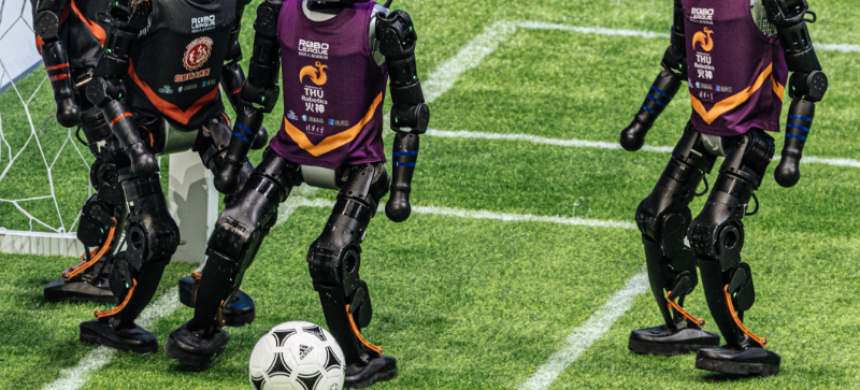BEIJING – China has made history by hosting the world’s first-ever fully autonomous football match played entirely by AI-powered humanoid robots, marking a significant milestone in robotics and artificial intelligence.
The groundbreaking event took place in Beijing on June 28, showcasing the capabilities of intelligent machines operating without any human intervention. Organized by top Chinese institutions, the match featured four teams from three universities, including Tsinghua University and Beijing Information Science and Technology University. Team Vulcan from Tsinghua University emerged victorious in the final showdown.
Played in a 3-versus-3 format with two 10-minute halves, the match was a showcase of machine vision, autonomy, and real-time decision-making. Unlike previous robotic exhibitions, these humanoid players were outfitted with advanced visual sensors, allowing them to track the ball, communicate with teammates, and navigate the field independently.
Clad in black and purple kits, the robots wowed spectators with their agility, balance, and AI-driven gameplay. Some even celebrated goals by raising their fists—mimicking human-like behavior. However, not all movements were perfect; a few robots lost balance during the game and had to be removed from the field by support staff, adding a surprisingly realistic twist to the futuristic match.
Read More: https://theneutral.pk/pakistan-assumes-un-security-council-presidency-to-lead-global-agenda/
Organizers highlighted the event’s core achievement: the robots’ ability to function completely autonomously using embedded algorithms. “This kind of match provides a real-world setting for testing advancements in machine learning, robotics hardware, and autonomous strategy development,” they told the Associated Press.
The humanoid robots were developed by Booster Robotics, a Beijing-based firm. Its CEO, Cheng Hao, emphasized that competitive environments like these offer ideal testing grounds for integrated systems involving perception, control, and locomotion. “They help push the boundaries of both software algorithms and physical hardware,” he noted.
This pioneering match also served as a preview for the upcoming World Humanoid Robot Games, set to take place in Beijing later this year. Organizers believe such events will boost collaboration between AI researchers and robotics manufacturers, opening doors for applications in areas beyond sports, including healthcare, manufacturing, and defense.
While the robots are far from matching the pace of professional human players, experts say that’s not the objective. “The focus here is not speed, but intelligence, coordination, and autonomy,” one official told state media—underscoring the deeper technological implications of this historic match.











